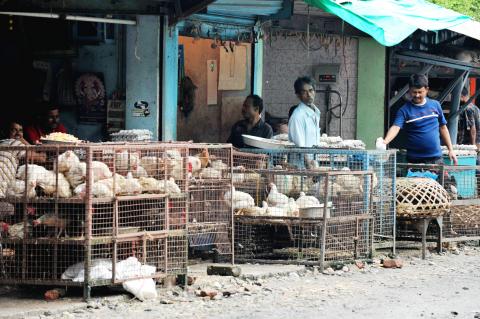Closing live poultry markets, though a huge economic setback, is a sure-fire way of curbing H7N9 avian flu in the case of an outbreak, disease control researchers said yesterday.
The closure of 780 live poultry markets (LPMs) in the Chinese cities of Shanghai, Hangzhou, Huzhou and Nanjing in April reduced the daily number of H7N9 infections by more than 97 percent, a study in the Lancet medical journal said.
“Our findings confirm that LPM closure is a highly effective intervention to prevent human disease and protect public health,” study lead author Benjamin Cowling of the University of Hong Kong said in a statement. “Without this robust evidence, policymakers would struggle to justify further closures of LPMs because of the millennia-old culture of trading live birds and the potential huge economic loss on the poultry industry in China.”

Photo: AFP
The study said losses associated with the closures in April have been estimated at about 57 billion yuan (US$9 billion).
A total of 137 people have been infected by the virus since February and 45 have died.
Live poultry markets are common in China and countries such as Thailand, Laos and Singapore, and present an ideal environment for virus spread between birds held together in very high concentrations.
The researchers had collected information about every laboratory-confirmed human case of H7N9 infection in the four cities over several months and constructed a statistical model showing the before-and-after effect of market closure.
The team found the closures reduced the average daily number of infections by 99 percent each in Shanghai and Hangzhou, and by 97 percent in Huzhou and Nanjing — and rapidly.
They also looked at the potential effects of other factors such as a change in humidity, but found nothing else that could explain the sudden drop.
Cowling said two new cases of H7N9 identified in China’s eastern Zhejiang Province this month were of “great concern” as they showed the virus had continued to circulate and had the potential to cause a new outbreak in the fall-winter flu season.
The team said local authorities must immediately close poultry markets in affected areas in the case of future outbreaks.
“In view of the potentially huge adverse economic effect of LPM closure, prompt and unanimous support of public health practitioners and clinicians for this necessary intervention will be paramount to protect human health from the... threat of avian influenza A H7N9 virus,” they wrote.
Avian flu viruses have been around for a very long time in wild birds, but they do not generally cause disease in humans, though in rare cases they mutate and jump species.
Strains of the H5, H7 and H9 avian influenza subtypes have caused human infections, mainly following direct contact with infected poultry. None of the strains have yet mutated to become easily transmissible from person to person — the epidemiologist’s nightmare.
The best-known strain is the H5N1 virus which has caused 633 confirmed flu cases in humans in 15 countries from 2003 to July this year. Of these, 377 died — a death rate of about 60 percent.

Incumbent Ecuadoran President Daniel Noboa on Sunday claimed a runaway victory in the nation’s presidential election, after voters endorsed the young leader’s “iron fist” approach to rampant cartel violence. With more than 90 percent of the votes counted, the National Election Council said Noboa had an unassailable 12-point lead over his leftist rival Luisa Gonzalez. Official results showed Noboa with 56 percent of the vote, against Gonzalez’s 44 percent — a far bigger winning margin than expected after a virtual tie in the first round. Speaking to jubilant supporters in his hometown of Olon, the 37-year-old president claimed a “historic victory.” “A huge hug

Two Belgian teenagers on Tuesday were charged with wildlife piracy after they were found with thousands of ants packed in test tubes in what Kenyan authorities said was part of a trend in trafficking smaller and lesser-known species. Lornoy David and Seppe Lodewijckx, two 19-year-olds who were arrested on April 5 with 5,000 ants at a guest house, appeared distraught during their appearance before a magistrate in Nairobi and were comforted in the courtroom by relatives. They told the magistrate that they were collecting the ants for fun and did not know that it was illegal. In a separate criminal case, Kenyan Dennis

A judge in Bangladesh issued an arrest warrant for the British member of parliament and former British economic secretary to the treasury Tulip Siddiq, who is a niece of former Bangladeshi prime minister Sheikh Hasina, who was ousted in August last year in a mass uprising that ended her 15-year rule. The Bangladeshi Anti-Corruption Commission has been investigating allegations against Siddiq that she and her family members, including Hasina, illegally received land in a state-owned township project near Dhaka, the capital. Senior Special Judge of Dhaka Metropolitan Zakir Hossain passed the order on Sunday, after considering charges in three separate cases filed

APPORTIONING BLAME: The US president said that there were ‘millions of people dead because of three people’ — Vladimir Putin, Joe Biden and Volodymyr Zelenskiy US President Donald Trump on Monday resumed his attempts to blame Ukrainian President Volodymyr Zelenskiy for Russia’s invasion, falsely accusing him of responsibility for “millions” of deaths. Trump — who had a blazing public row in the Oval Office with Zelenskiy six weeks ago — said the Ukranian shared the blame with Russian President Vladimir Putin, who ordered the February 2022 invasion, and then-US president Joe Biden. Trump told reporters that there were “millions of people dead because of three people.” “Let’s say Putin No. 1, but let’s say Biden, who had no idea what the hell he was doing, No. 2, and